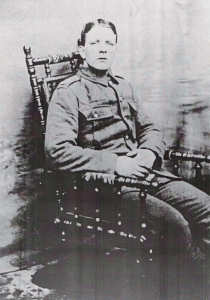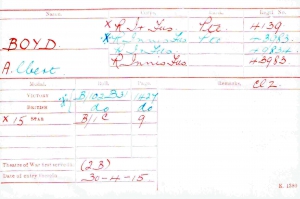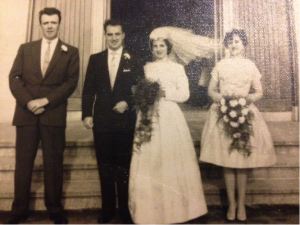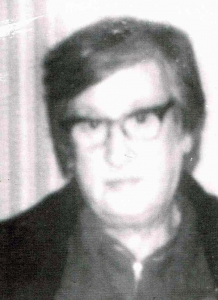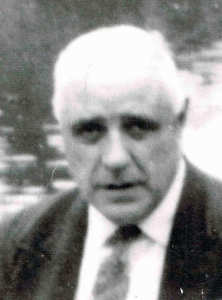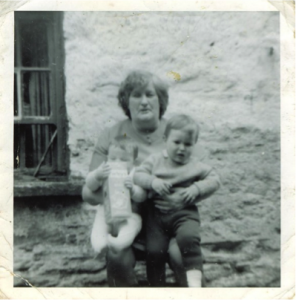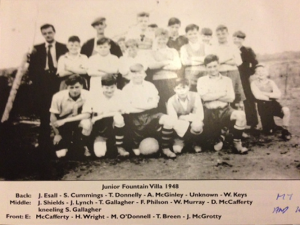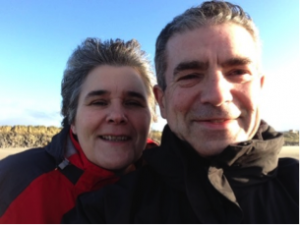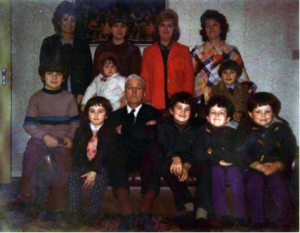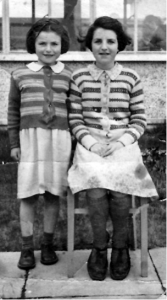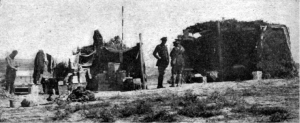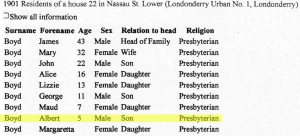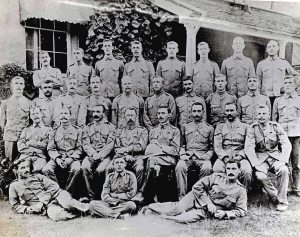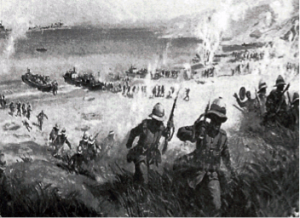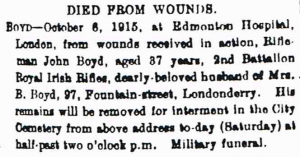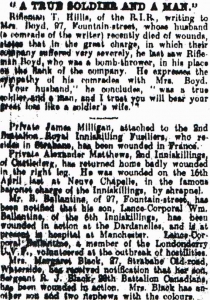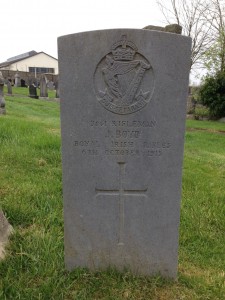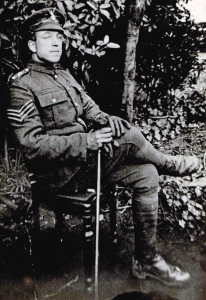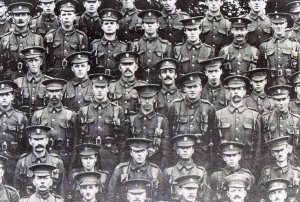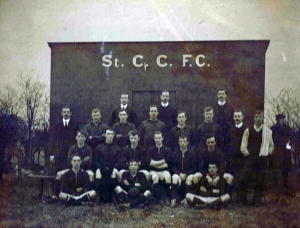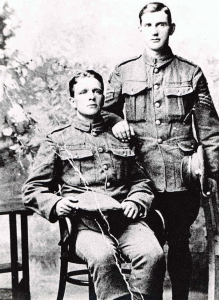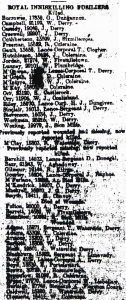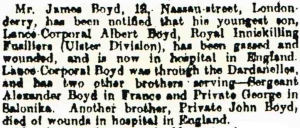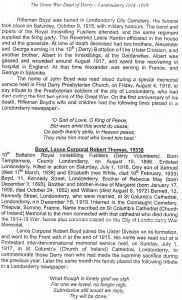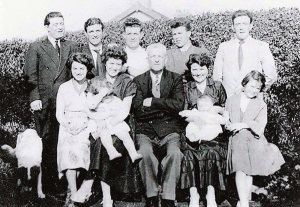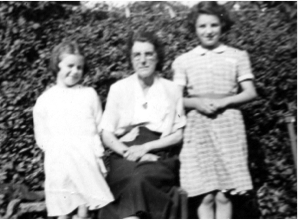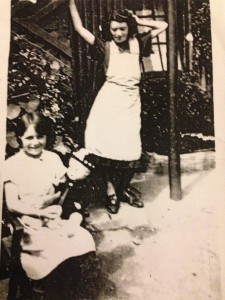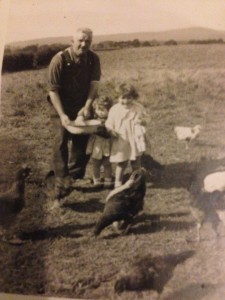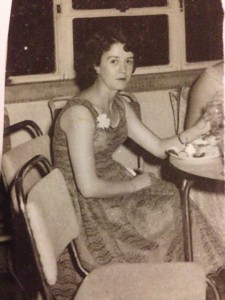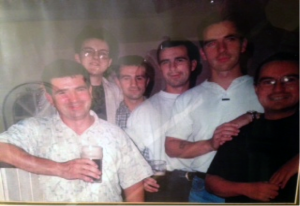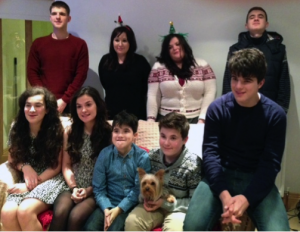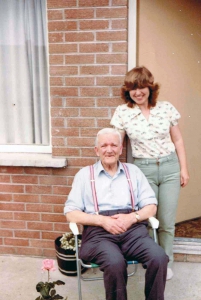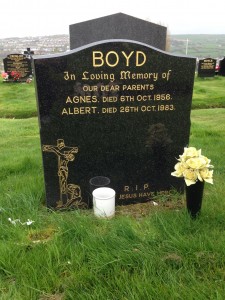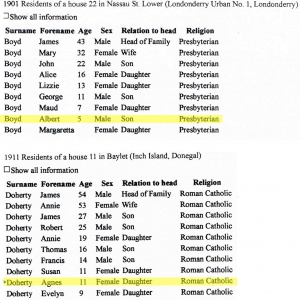This website looks into the life of First World War Soldier, Albert Boyd and why a war that only lasted four years has influence on so many lives one hundred years later.
My name is Stephen McCafferty, son of Danny and Mary McCafferty, grandson of James McCafferty (Father’s side) and Albert Boyd (Mother’s Side).
I knew little about my Granda James McCafferty as he died in July 1972 and being the first dead body I had ever seen in a coffin, it scared me. I do remember him years before that as my brother and I would call to his house at lunchtime from school to get dinner from my granny. Their house was at 2 Strabane Old Road Waterside, Derry.
I always remember my granny giving off to him, whenever she got the chance, but my granda McCafferty came a cross to me as a sort of gentleman ,who was very tall, compared to me then anyway.
.
At other times my brother and me would also get our dinner at Mrs McKeevers house, who was my aunts mother in law, I really liked Mrs McKeever, as only a boy I found her very unusual, but not in a bad sense as she had a glass eye, one of those hearing devices and a little box in her pocket. I was afraid of her glass eye ,which she would occasionally take out.
.
Mrs McKeever was always good to us, but I have to say my brother Paul and I really struggled with her dinners, as her spuds where built on a plate like a mountain, many a time I had to put spuds in my pocket just to say I finished my dinner. How often did I hear those words “eat up now so you can be big and strong”, with another helping of spuds.
I found out later that my granda McCafferty was in the old IRA and was in prison in derry at one time. I do remember my brother and I walking in a field near the top of the hill with my father and granda and he spotted a big hare in the field. I was born in 1962 and unfortunately don’t remember a lot about my Granda and Granny McCafferty.
.
When my Granda McCafferty died in 1972 it was a big shock to me, I had never encountered death before, I hadn’t seen people crying on a large scale before.
.
I had never seen a dead body in a coffin before, I also had never seen a coffin being taken through a window before. Terraced houses were never designed for coffins. I remember it was a beautiful summers day when I asked my father was my granda dead, when you’re a kid you just say things as they are, almost like a reporter, but I new it really hurt my father as he was very close to his father.
I wish I had known my Granda McCafferty more, but time wasn’t on our side.
.
Albert Boyd (my mother’s father) had always lived with us as far as I could remember so in a way I had three parents.
.
What I can remember about my Granda Boyd in the early years was that he smoked a lot. He sometimes set fire to the bed clothes and on one occasion we had to get out of the house in Mill Street, which was opposite the Railway Station in the Waterside of Derry. All I can remember was the smoke coming down the stairs of the house and me running ahead of it, and the fire engines waiting outside.
.
But I loved Mill Street, times spent there were happiest days of my life. The buses used to park along the road when they weren’t in use, and my father would take my brother Paul and I on them. I loved it because it was before the troubles, a time of relative peace. We had an outside toilet, which was freezing in winter, but that didn’t bother me, we had a big jaw box sink, and we had friends up the street who had better toys than us and we loved playing with their toys.
.
I remember my brother being sick one night. I woke up to hear him throw up into the bucket that we used for peeing at night, my mother was there helping him. My mothers magic trick was two fingers down the throat, I got out of bed to go over to my brother, and the next minute I was throwing up into the bucket, followed by my mother who also started throwing up in the bucket. Now I know where I got the weak stomach!
.
Years later I would still wretch at the site of my kids dirty nappies, much to the amusement of my wife Deborah.
Granda Boyd influenced my life in many ways just by living with us, otherwise I really think I would have taken a different direction, or outlook on life, but I will never know as these were the cards I was dealt.
.
We moved to 34 Anderson Crescent 1967/68. It’s hard to remember exactly as I was still very young at the time, but it was just before the troubles anyway.
It was that point in my life that war became an influence, as a child you are surrounded by things happening, but in a way I had no choice. My Granda was obsessed with the news, and on the news at the time was the Vietnam War. Every time the news was on he watched it, and in turn whether we liked it or not we watched it too. Whether you’re there in a war situation or not it affects you, it influences you.
.
Even then being so young I felt sorry for the Vietnamese people who we’re getting bombed, when I first meet my future wife Deborah, I was very attracted to her because she was very like the Vietnamese, well Deborah still laughs at this.
.
1969: The Troubles start
.
Where we lived we had a good of view of Creggan from our house at 34 Anderson Crescent, and we could see the troubles unfold. My Granda had a pair of binoculars so we could get a better view of what was going on. Back then binoculars were as good as HD, it brought the reality closer .
.
But reality struck when my father took us through the Cityside the next day, to me at a young age it was exciting, seeing cars upside down, shops burned, it was a different world, a world of destruction and negativity. I’ll will touch on these points later, but these are influences, these condition our lives but at the time we don’t realise it.
.
I still remember my father taking my brother and I for an ice cream at night in the Bogside. All I could see was people running everywhere as the army moved in. I can’t remember if I did get to eat that ice cream.
.
When Derry started to be bombed, my mother would take us in those never ending bomb damaged sales, my brother and I were nice and clean before we went into the shops, but we were two smokey joes when we got home. My mother thought one day when we got a real bargain box of Kimberly Biscuits only to find they tasted of smoke when we got home.
Around 1971 we moved to our new house at 8 Adelaide Avenue in the Kilfennan area of the Waterside. It was a new house and for us an exciting time, making new friends, and helping my father do the garden and building a new garage. My father was a very hard working man, something I took on for the rest of my life.
.
My mother was very house proud ,and at the time it seemed she cleaned all the time (which she didn’t) but much to the annoyance of my own kids, I have been influenced by my mother when it comes to cleaning, although they call it OCD today. Not nice I know.
.
Watching Albert as we grew up you could see the military influence in his life. Every morning he would rise early and get the breakfast ready, and Albert made real food, call it food for a soldier. His porridge was the best with plenty of salt in it. To me it was proper porridge, not like now where you are told what is bad for you.
.
He was also great at making Irish stew, although one time I think he thought he was back at the western front, as my mother who always embraced the modern bought a pressure cooker, of course these things had to be watched and I don’t think Albert liked it much.
.
But one day the pressure cooker got the better of him and we heard a bang in the kitchen, we rushed to the kitchen only to find poor Albert covered in Irish stew and there on the cooker was half a pressure cooker. We never used a pressure ever again.
.
Another thing Albert used to do was watch through the venetian blinds who might be coming up the street or coming to the door . He was most definitely a watcher , may be he was a sniper in the trench who knows,
Well one day his cover was blown when he was at his daughters house susie in creggan ,
He was looking through the venetian blinds when suddenly Susie,s son Kieran pulled the blinds up fast , poor Albert s cover was blown and he called young Kieran everything that day.
.
Being the eldest I shared a room with my Grandfather Albert, and that is really the time when as a child you would watch his mannerisms. Every night he would listen to the world news on the radio, as always it was doomsday stuff – wars,the troubles and what was going to happen next. In a way for him it was just the First World War replaced by other wars through out the world.
.
He would regularly talk about the war, where he had been, where he had been shot, how the Prussians would try to poison him, how he disliked the Turks at Gallipoli as he was captured there at the start of the war. I remember a lot of the names Messiness, Passchendeale, Ypres.
But it was when my Granda had his dreams at night it really scared me. He would shout names out loud calling people, it was so real to me at the time ,it was only when my mother came into the room did he wake up after she had shouted a few times.
.
I watched my Granda after he thought that a flea had bitten him, that was something to see. His soldier instinct would take over and he would start to go through the seems of his clothes looking for the flea, which I don’t think was ever there as my mother was so house proud. But for him it just took him back to the war years, he stripped the bed and used flea powder to kill that flea.
.
During the troubles my Granda was a real worrier, especially when my mother went shopping and didn’t come back for a long time. Albert would pace the floor and sometimes whistle a wee tune to himself. Years later I found out that when the men waited to go over the top of the trenches they would quietly whistle a tune over and over in their head, as the soldiers once said they had to concentrate on something small to stop them going off their heads due to the tension waiting to go over the top. But remember despite what he went through in the war years, I have to remember he worked hard to bring up his family,
.
He married a Catholic girl, which just after the First World War was a big thing, and he suffered because of that as there was no such things as mixed marriages then. Becoming a Catholic wasn’t easy for him I am sure, many a time I saw him faint at mass so the priest would usually call to the house once a month. I have to say Albert was a hard prayer at night before he went to sleep, maybe because of what he went through seeing his friends being killed. Maybe seeing so much death and having to kill or be killed.
.
Despite all that he went through he was a funny man. Yes he had witnessed people being blown to pieces in the war, he had to live in terrible conditions in trenches. He even told me one time about seeing a soldiers going off to the toilet and next minute seeing them hit by a shell and just disappearing, but as they say these days he marched on. The first world war would have been a big adventure for young men back then.
.
I have no doubt there would have been great times during that period also, and because many of these young men knew when they where in a battle that there was a high risk of being injured or killed they had to live life to the full.
.
From my father I learned hard work .
From my mother I learned OCD.
From my granda I learned about the First World War
.
I took on those regimented ways, I always wanted to join the army but it never happened.
.
At this point I want to talk about what I know and what my granda and Boyd’s family have told me about the war.
.
Albert lived first at 22 nassau street lower 1901 then 12 lower nassau street 1911
My granda joined the army as an underage drummer boy.
He had a few different army numbers for some reason, moving back and forward between Royal Irish Fusiliers and Royal Inniskillin Fusiliers
.
The 1st Inniskillings were stationed in India, after the out break of war they went to England for training before heading to Egypt . From there they were sent to the 1915 landings at a well-named Hells beach as the 29th.
This is where Albert would have landed at the Gallipoli. It was here Albert was captured by the Turks, but he managed to escape.
My granda alway referred to it as the Dardanelles, I remember him telling me he didn’t like the Turks at all. In a way fate had it that he managed to escape. The Turks executed a lot of prisoners, probably because they had no way of keeping prisoners and had little food themselves. Being Muslim they would just see the soldiers as infidels maybe that’s the reason Albert was treated badly.
.
Gallipoli was a failure on the British part and Winston Churchill got the sack for its failure, but remember he went on to bigger things unlike the many that died at Gallipoli from Britain, Ireland, Australia and New Zealand.
Gallipoli was bad enough that it had failed but the men had to cope with the intense heat and disease from rotting corpses. Albert and his regiment were then ordered to Egypt as the Dardanelles where abandoned. From egypt they went to Marselles in France and from there to the western front.
.
Albert, along with his regiment were getting ready for the Somme offensive.
.
I don’t know if Albert knew at the time that his eldest brother John was wounded at Mons, and had been transferred to an English hospital where he died in October 1915. His body was returned home and he was buried in the city cemetery, his name is on the city cenotaph.
Alex Boyd survived the war, all I know is that he worked at Austins in Derry as a tailor, in his picture you will see him as a Sargent, but I met Alex ‘s son and wife who gave me some of the photos from the first world war.
George Boyd played for a football team before the war, like my Granda he was an excellent footballer.
George Boyd or as he was known, trooper Boyd was in the Inniskilling, not sure which. The only thing I know about George was that he was caught in massive shell fire and was buried for three days. According to my aunt Evelyn he was discovered on an island, this could have been Salonica, or part of modern day Greece. The story goes that his parents had to search for their son after the war.
George was never the same until he died, he had shell shock and never really talked much after that He lived with his sister at 12 Lower Nassau Street until he died in the fifties. Albert was gassed at the front ,then was taken to a hospital in England where he recovered and was sent back to the front. This is according to newspaper clippings in 1917.
The soup came up in a big tin can
an eggcup full for every man
They got so drunk
they could not stand
So they joined
the jQuery111305970639288425446_1449774059780?? army.
Albert returned to the front then at Passchendeale 1918 Albert was shot, the bullet passed through his bottom right jaw and exited through his left cheek. This injury took out all his teeth. I think a bullet grazed his forehead also as he always had a mark on his forehead.
Albert lay for a long time in the mud soaked battle field of Passchendeale, and doomed to die especially in that particular battle where many simply drowned in the mud. But a German officer found Albert and he was taken to a German hospital where he was taken care of, until he was sent to a prison camp where he stayed until the war ended.
.
This is an account from the last survivor of passchendeale. Harry Patch
.
I fell into a trench .There was a fella there same age as me.He was ripped shoulder to waist with shrapnel.I held his hand for the last 60 seconds of his life.He only said one word :Mother: I didnt see her,but she was there.No doubt about it.He passed from this life into the next,and it felt as if I was in God,s presence.
.
I,ve never got over it.You never forget it. Never.
.
He talked to me a few times about this saying he liked the ordinary German soldier but he didn’t like the Prussians as he thought they where trying to poison him, and later in life he had this thing about poison. Whether it happened we will never know but what happened him in the great war affected him in different ways for the rest of life .
The gas affected him for the rest of his life as when he had a panic attack he would gasp for breath. That’s what the gas did to you. No matter how much we try to explain what the war was like we will never really know as we where not there, and I think that’s way soldiers who came back never really talked about the war in depth and to be honest I don’t blame them. Just like someone who looses a loved one who are we to say how they really feel.
.
On the 28th June 1914 a Serb called Principo got an opportunity to kill Arch Duke Ferdinand and his wife. Call it fate but just because the driver took a wrong turn the Arch Duke and his wife were shot at close range and this started a sequence of events which started the first world war . But whether the Arch Duke was shot or not I think there would have been a world war anyway. Austria-Hungary was in a fragile state, and its arrogance ensured its own downfall due to the build up of armies and tensions between countries.
.
The countries of Europe were trying to be modern but the war brought weapons of mass destruction, shells, gas and machine guns that butchered men.
.
10 million died, think about that amount, but I will break it down to one family in Derry.
.
The Boyd brothers
.
Alex Boyd survived the war, physically anyway. He was in the 10th Inniskillings. John Boyd died of wounds at war and was buried in city cemetery. He was in the Royal Irish Rifles. George (trooper) Boyd was buried for three days by a shell. He was never the same mentally and died in the fifties at the house he was born in located at 12 Lower Nassau Street. He was in the 10th Inniskillings. Albert Boyd, youngest son was captured by Turks, gassed by Germans, wounded and taken prisoner. He was in the 1st Inniskillings.
.
I have no doubt Albert was affected by the war in some way ,there where times when Albert would go into deep moods which would last up to a week ,where he would just sit in his room staring out the window as if nothing mattered to him at that moment and time.Only coming out for something to eat and then go back to his room.
.
I seen this happen a few times ,but talking to his daughters also confirmed this happenend alot to him from time to time,but then it was never called post tramatic stress disorder,or depression, it was just a mood.But how could a person have nightmares about the war.How could it not affect him from time to time.
Albert came back from the war but his struggle never stopped, selling his pension in England to Vulgers who prayed on young soldiers coming back from the war. He married Agnes a Catholic girl from Baylet on Inch Island in Co. Donegal and raised a large family. Agnes died in 1956 from asthma, so he was left to bring up a family on his own. They moved to Moss Road in Derry.
Albert was the one person people in the Moss would come to to wash the corpses, and when Messiness Park was bombed in the Second World War he was there helping people.
But for the mercy of a German officer, the family line would have died at Passchendaele
As I can remember Albert lived with us until he died on 26th October 1983.
Alberts movements as a Soldier, serving with the 1st Battalion of the Royal Inniskilling Fusiliers.
August 1914 : in Trimulgherrey, India.
10 January 1915: Recalled to UK and landed at Avonmouth.
10 January 1915 : Came under command of 87th Brigade in 29th Division. Moved to Rugby.
March 1915 : Sailed, going via Egypt, and landed at Cape Helles, Gallipoli, on 25 April 1915.
January 1916 : Evacuated from Gallipoli to Egypt.
18 March 1916 : Landed at Marseilles for service in France.
5 February 1918 : Transferred to 109th Brigade in 36th (Ulster) Division
Thank You
The Boyd Family, McCafferty Family, Edie and Denis McKeever, Bobby Kilgore, Alex Boyd’s son and wife from Fountain in Derry.


